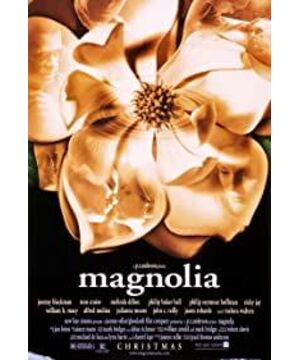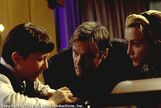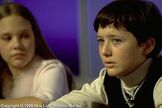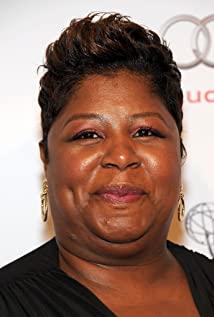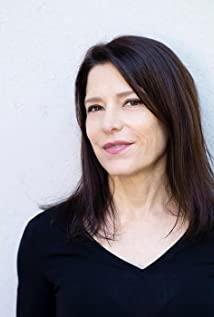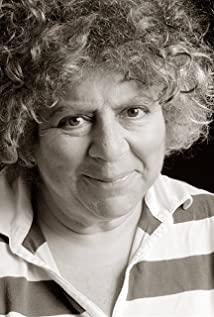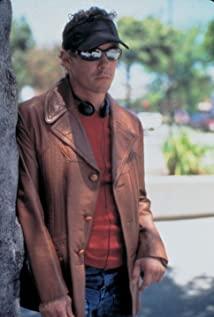Márquez's first words to Emanuel Carvalho, who came to interview him, were, "The first six novels of all novelists are autobiographical." "There Will Be Blood", Anderson's five feature films, shows that the autobiographical element is not completely isolated from his work, and in "Magnolia", "we forget the past, the past does not forget us" is the most weighty lines, the only fiction that this film makes us think of is the horrific "frog rain", other than that we can't find the kind of "the worst part is definitely made up" that Márquez said For example, Anderson also indulges in the nourishment given to him by the scars of growth, and if the stripping of kinship provided Orson Welles with a reasonable incision to understand "what a tragic man is," for Anderson it was this 37 An overwhelmingly pessimistic look at the modern family projected by a man of age.
Anderson obviously loves his third child, "Magnolia", and from the beginning, he gave it a lot of explanations, which is unimaginable for a creator who is tired of interpreting his own work, and he also likes to talk about it , "I will create the perfect movie in my lifetime, maybe I have made some rubbish, maybe I have won some awards, but I have a strong premonition that "Magnolia", whether good or bad, is the best thing I have ever created. The movie.” Clearly, that emotion and enthusiasm continued throughout the making of Magnolia, and Cynthia Fuchs said they were part of the movie.
In an article titled "A Valley Boy Rebuilding a Family Near Home," Anderson wrote, "There has always been nothing but houses and trees here." The San Fernando Valley gave Anderson his initial memory of growing up, only barren , this barrenness has nothing to do with material things, because the San Fernando Valley "the only thing that has anything to do with filmmaking is the pornographic film industry," which Anderson calls "the capital of adult films," or "Sunset Boulevard." "If you're young and horny, It’s an interesting place to live.” There is no doubt that in such a place where pornography is rampant, the state of human existence, the spiritual texture, all point to corruption and depravity. Before the creation of "Boogie Nights", the last thing Anderson wanted to face was his hometown. He was like Eddie the swordsman in "Boogie Nights" or Frank in "Magnolia", and finally chose a way to leave home. way of sadly burying the past deep in memory, "For many years, I was ashamed of the fact that I thought if I hadn't come from a big city like New York or a farm in Iowa, I wouldn't Show where I come from." It's easy to think of Frank's complete falsification of his own family background, the reporters put his real life in front of him like iron, and he forcefully wiped it out with anger and even humiliation. own past.
We later learned that much of Anderson's rejection of self-identity was due to his family. "Boogie Nights" has a detail that is thought-provoking - Eddie only says goodbye to his father after an unpleasant interruption of breakfast, but cools his mother. Soon he had a big argument with his mother, crying and swearing, then moved out of the house and never went back. Apparently, Eddie's mother wanted her son to live a normal student life instead of messing around with rambunctious women, so he often taught him a lesson, but Eddie believed that he was "prepared from birth" and there must be A soaring star dream is waiting for him to realize.
We don't know if the rift between Anderson and his mother is as manifested here, but Eddie's dream is undoubtedly Anderson's most personal projection. The difference is that Anderson chose a creative path, but he did in one of the most personal The impulsive age contradicted his mother. Anderson and his mother did not understand each other and hurt each other, which constituted a kind of psychological tension in Anderson's growth, which eventually led to Anderson's alienation from his mother, which was reflected in the former's works. Anderson said he understands Truffaut, who is also traumatized. Truffaut's theme of "Mama and Whore" in "Shooting the Pianist" was extended to "Boogie Nights", and 17-year-old Eddie was in the motherhood. Porn star Maggie finds a part of her missing motherly love, and Maggie fulfills her emotional cravings that aren't properly given to Maggie's biological son, Andrew, who calls her at one of his mother's parties and doesn't. Waiting for the answer, which became a fuse in the collapse of Maggie's marriage, Andrew was taken away by his father. Maggie says she misses her two sons, "Andrew and the Knife," Eddie returned to the porn industry after failing to "run away" and collapsed in Maggie's arms crying like a child, who was auspicious and soft Patting Eddie on the shoulder like a mother, Jack said to Eddie, "She's the best woman and a good mother, and she loves all those who need a mother's love."
It should be said that, like Truffaut, Anderson's feelings for his mother are mixed with love and hate. "Mom and the Prostitute" is not a weapon used to attack his mother. It is said that Eddie's physical relationship with Maggie reflects the director's intention. Anderson's disrespect. In fact, Anderson is full of self-blame and remorse for his discord with his mother, and he also strives to set up some kind of redemption in his works, although this kind of redemption is often easily deconstructed by his anti-religion, "Magnolia" is full of Struggling with this undeniable contradiction of redemption and anti-religion, the role of the mother is less important or absent to a considerable extent than the role of the father in this film, or, in other words, the family ethics that "Magnolia" explores. It is based on the relationship between the father and the children, and the mother is insignificant: Claudia's self-abuse was caused by her father's violation of her in the past, and the mother's comfort did not appear in time; Anderson did not mention the mother of the genius Stanley; Not to mention others.
Frank and his mother were abandoned by his father. In the last days of his mother's death from cancer, he took on the burden of caring for his mother at a young age, which became the reason why he could not forgive his father. By designing the details of Frank taking care of his mother, Anderson achieved a certain possibility of redemption for himself. Just like Frank, who hated his father so much, finally cried in his father's hospital bed, we do not doubt that Frank still hated him so much at this time. The father, but a son who honors his mother, Anderson fails to explain why his protagonist is so sick of women, Frank's career is clearly full of assault and disrespect to women, and the word "bitch" is all over the place in his preaching. . The anti-redemption is unmistakably revealed here, just as Linda was full of grief and guilt over her husband's death, but life could not dictate the way of her redemption, and in the end she chose to commit suicide. Anderson, who still struggles with this, develops a model of stepmother for his uncaring protagonist, whose function is somewhat more indicative of his maternal aspirations, Julianne Moore in "Boogie Nights" The porn actress she plays is actually the same as the stepmother in "Magnolia", and she is exercising her role as an "emotional substitute" for her "son".
"Emotional substitution" is a potential theme for Anderson, which carries over from character to geography. Anderson said he loves Paris and Los Angeles more than the San Fernando Valley. Even though he later recovered his affection for his hometown, this feeling still failed to Let him step into the house. Still, returning home to film shows the precocious genius willing to face his past, and both he and David Goyer knew that to overcome fear itself, he had to bravely go back to the one that Bruce Wayne made for Bruce Wayne as a child. Nightmare's Batcave, Anderson said, borrowing Donny's words, "we forget the past, but the past doesn't forget us." He began to compare the San Fernando Valley to a mother, and wanted the mother to be kind to his work, his son , "For Magnolia, I want it to be the mother of all San Fernando Valley movies." Rather than returning to San Fernando is like returning to a mother's womb, Anderson's kinship in this kinship In trying to find the feeling of home, "Every place here is like a living script, and filming here makes me feel like I'm not sleeping in an unfamiliar bed every night." Designing every scene in the film within a 15-minute area around home Scenario, "Completing an inner look, I thought, where should I place my backstory? The answer is, as close to my home as possible." Rebuilding an alternative home close to home, rather than choosing to go home, we find , Whether it is "Boogie Nights" or "Magnolia", Anderson's idea of designing a story location does have a kind of narrative wonder, we might as well call it "satellite city narrative" or "orchid body".
"Orchid Body" realizes Anderson's extraordinary talent for structuring grand allegorical narratives. "Magnolia" is as complex as a giant web, including 12 soulless characters whose complexity and intersection forced Anderson to fail. To achieve the plan to complete the story in 30 days, everyone endured the self-exile of their souls. They tried to let everyone who crossed in to fill their extreme loneliness, but found that the soul of the other party was like a huge black hole, unable to emit even a little bit of light. , "Boogie Nights" inadvertently "as long as there is love, there will be no difficulties in the world, and the depths of the heart will be peaceful" is deeply questioned by the hysterical Donny here: "My heart is full of love, but I don't know how to release it." They are like the petals of a magnolia flower, all tied to one point, but terribly enclosed in their own world, isolated from each other. The only mirror relationship on the orchid petals is the TV producer Carl and the show host Jimmy, both of whom are affected by cancer. Troubled, they are doing the last guilt for alienating their children.
Cancer in the film has constructed a two-way metaphor of the body and the spirit. It should be said that Anderson used it to deal with the modern edict of the individual and the family. From the beginning, the film has an allegorical texture in the text, and through the film's final "" "Frog Rain" to achieve a mythical depiction of the chronic mental illness of modern people, it reminds us of the earthquake that Anderson's mentor Robert Altman designed for "Short Films" aimed at middle-class life, Anderson said his Myths came from watching Spielberg's films, "I saw his films and I understood they were myths. I also understood his intentions, so I made a film about cancer and frogs."
"Frog Rain" drew polarized reviews, and more often, people pointed to its religious nature, and in an article in The Washington Post Stephen Hunt described it as "pure American magical realism" Style, Big Man from the Mad Hands of God", "is an intricate meditation on eccentric patterns". From spiritual corruption (drug use) to degeneration of humanity (Claudia was violated by her father), the San Fernando Valley reminds us more or less of the city of Sodom. The people of Sodom were licentious and promiscuous. In order to punish them, God, Fire and brimstone poured down from heaven, burning Sodom to ashes. Here, the San Fernando Valley, "Frog Rain" offers the regionality and anti-redemption possibilities of allegorical and religious narratives.
The profoundness of "Magnolia" is not limited to this. The multi-layered and continuous nature of its text provides Eco's disciples with the most abundant space for interpretation. Roger Ebert accordingly classified Anderson as Spike Jones, the Great David Russell's camp, whose flamboyant assertiveness "rejects the shy postmodernism of the '90s," "isn't the kind of film that makes a necessary apology for richness and self-preserving irony, Sincere skepticism deconstructs modern ethics."
Original "Cinema World"
View more about Magnolia reviews


